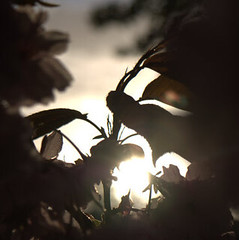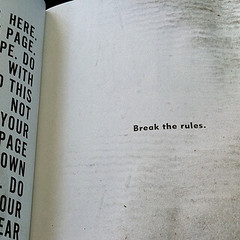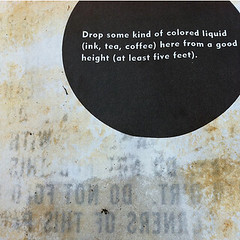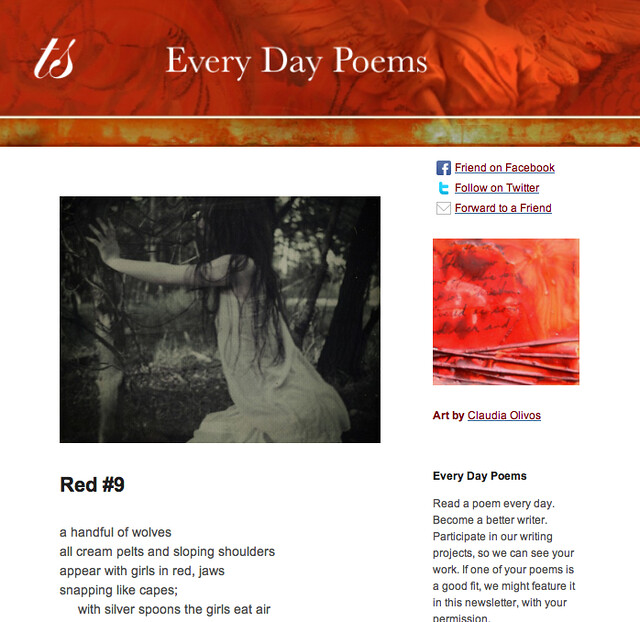The best in poetry, (and poetic things), this week with Matthew Kreider.
1 Art
I’ve never imagined anything like this. Sculptor Yasauki Onishi uses plastic sheeting, hot glue and an assortment of cardboard boxes to create “reverse of volume.” This breathtaking piece of “vapor frozen in time” might inspire you to remove the boxes and bulk from your own poetry.
As a kid, the appearance of a train crossing the street always captured my imagination. While sitting in the passenger seat of my dad’s car, exotic train cars rolled past me with mystery cargo and spray-painted graffiti that broadcasted strange words and peculiar shapes. Where were the trains going? And who had marked them along the way? Here’s an Instagram tribute to the magic of graffiti.
2 News
When my students write research papers, I teach them about attribution. Attribution is vitally important for all forms of credible media, But in today’s online social networks, users often share the artwork of creatives without giving credit where credit is due. Behance recently seized an opportunity to inform, announcing a new collaboration with Pinterest, to ensure attribution counts every time.
In fourth grade, Olivia hit me in the face. My cheek burned for days, and my bruise didn’t go away for weeks. “No.” (That meant she didn’t want to be my girlfriend.) That was one of my earliest experiences with the powerful physicality of language. The Museum of Modern Art recently opened an exhibit which showcases the physical presence of words and their role as building materials in our lives.
3 Publishing
Jane Friedman is an expert on publishing and social media. She likes how the heat of innovation can bend how we process the world. Inspired by Friedman’s creative energy, L.L. Barkat, managing editor at T.S. Poetry, has just launched an exciting new sponsorship with Writing on the Ether for the month of May. I’d say it turned out pretty nicely. After all, her book is now sitting beside Munch’s “The Scream.”
Over the years I’ve taught journalism students to use Pagemaker and Quark Express. But then came the new format. Peter Brantley considers the current digital state of publishing. He says, “True digital standardization has yet to come, and we don’t even know where to watch for the vector of its arrival. But these are the most exciting days in publishing that I’ve ever seen.”
4 Reviews
You may have quoted him at some point. If not, you’ll soon be able to once you page through Phillip Larkin’s Collected Poems. Readers both love and hate the smooth accessibility of his style. Still, Stephen Aky writes, “Paraphrasable but irreducible, Larkin’s work remains poetry, not argument.”
Mark Strand’s new book, Almost Invisible, looks at how an aging American poet’s voice struggles to fill the sanctuary of poetry. Because Strand’s earlier work points to an echoing uncertainty about the relevance of poetry in our culture, readers will want to pay close attention to the tone and timbre of his words.
5 Creativity
I tend to think selfishly when it comes to creativity. How do I get it? And what can I do with it? But Katie Sokoler’s stone-painting project in her own Brooklyn neighborhood causes me to reconsider how I spend my creativity.
I have a four-year-old and a three-year-old at home, and well over 100 teenagers at school. Sure, they keep me busy with a hefty load of tasks each day, but they also fill my head with a dizzying cacophony of voices. I used to think creativity required a quiet week at the beach. Now I’ve learned creativity needs only 15 minutes between fights. Here are the Counter-Intuitive Benefits of Small Time Blocks.
6 Write-It
Some experts advise writers to eat, sleep and breathe writing contests. It’s the only way to beat the Pop Tarts of the publishing industry. Most contests cost us time and money. Do writers really need to enter them? And why should they pay? Stephanie Vanderslice shares her thoughts on fee-based writing contests.
Okay, while you sort through all of that, here’s a free poetry contest to consider.
7 Poems
Poems offer us an opportunity to play with design and scale. When I read Tania Runyan’s “Jelly Belly Warehouse Tour” last month as part of Every Day Poems candy theme, I quickly marveled at the arrangement of those jelly beans.
A few months ago I began reading some of Malcolm Guite’s poetry. Living in Cambridge, he’s a poet and scholar, priest and rock and roller. I invite you to read “What If” — and there’s even a link for you to listen to him reading the poem. His voice is unforgettable.
8 People
Do you categorize your bookshelves by genre, author, color or size? Whatever your personal style, if you love books, it’s bound to get tricky as your collections grow. Stephen King tells the UK Sunday Times Magazine the story of how a woman once tried to place him upon a shelf at a grocery store.
Maurice Sendak passed away a few days ago, but he left us with so many memories. Where the Wild Things Are was given to me by a friend in high school while I was recovering in the hospital from a coma and traumatic head injury. It was a “wild rumpus”, I assure you. But eventually I did make it back home to my bedroom, where I found my journal. That right there tasted like a plate of hot supper.
9 Education
Fiction is growing increasingly anemic in school curricula. Meanwhile, nonfiction has strong shoulders and clearly-defined muscle tone. Jonathan Gottschall makes a case why fiction is good for you. He says,
“Studies show that when we read nonfiction, we read with our shields up. We are critical and skeptical. But when we are absorbed in a story, we drop our intellectual guard. We are moved emotionally, and this seems to make us rubbery and easy to shape.”
I don’t know about you, but I want my kids to grow up rubbery.
10 Sound n Motion
Growing up, I thought math was pretty ick. But then my grandfather, a mathematics professor, introduced me to new ideas, like those in Abbott’s spectacularly geometric book, Flatland: A Romance of Many Dimensions. Here’s a 1965 Academy Award-winning short film based on the book. You’ll love The Dot and the Line: A Romance in Lower Mathematics.
Finally, please don’t overlook the music of ordinary things. Dieggo Stocco was asked by Burt’s Bees to create a music video performance using only their natural ingredients as instruments. This is all natural, folks. No artificial colors, synthesizers or digital sampling.
Photos by Claire Burge. Used with permission. Post by Matthew Kreider.
___________
Buy a year of Every Day Poems, just $2.99— Read a poem a day, become a better poet. In April we’re exploring the theme Candy.
- Casting a Line for Surrealist Poetry - November 12, 2012
- The History of the World in Beer - October 22, 2012
- Journey into Poetry: Matthew Kreider - July 23, 2012












Megan Willome says
‘Morning, Matthew.
On the subject of poetry contests, I have a friend who enters the state ones religiously and has had a lot of success. Their fees are low, and she often wins enough money to make up for those low fees. It’s amazing how a poem about, say, a rattlesnake, can place in multiple states.
Matthew Kreider says
Megan, I don’t know about rattlesnakes. In Portlandia, if you take your poem and “put a bird on it”, you’ll likely do rather well. 🙂
Maureen Doallas says
The Onishi piece is wonderful.
Excellent link roundup, as always. Lots of very good stuff.
Monica Sharman says
Thanks for the heads-up on the math books. I’ll see if my library has them. I sure hope so, because I had a lot of fun reading Here’s Looking at Euclid, by Alex Bellos.
Charity Singleton says
Another great round up. I particularly liked your reflection on Maurice Sendak, and the bit about creativity in short spurts. It works for cleaning and other projects, too!
Matthew Kreider says
Maureen – I doubt the picture or video does Onishi’s piece justice. I’d love to see that negative space with my own eyes.
Monica – My mom remembers a blizzard and her dad driving 10 mph through the storm. He told the story, line by line, as they inched along. It’s a great story. I hope you like it!
Matthew Kreider says
Charity – As I grow older, the art of using short blocks becomes more and more necessary. Sure miss those long blocks, though. 🙂
Kimberlee Conway Ireton says
Matthew! Great links, once again. I loved that Onishi piece (even watched the video!) and the Music from Nature; I shared that one with my oldest son. It made us both grin. Thanks for that gift!
But coma? Head injury? You can’t just slide those words into a paragraph and expect to get away without questions!
Tania Runyan says
Oh, I want to find one of those sweet little rocks!